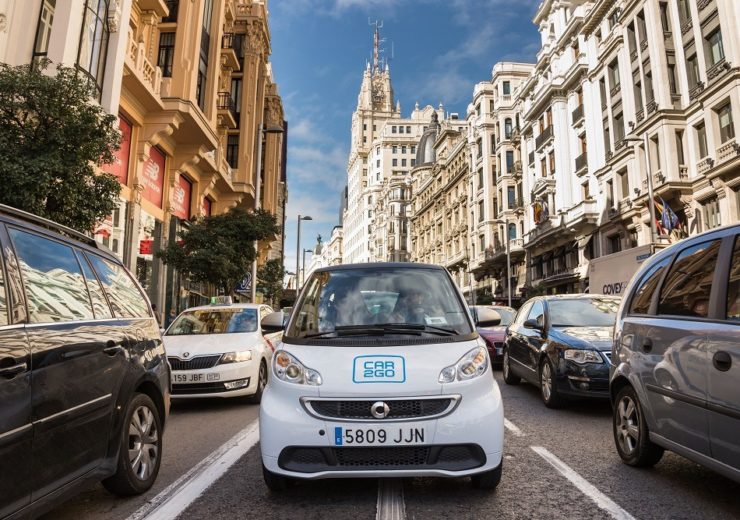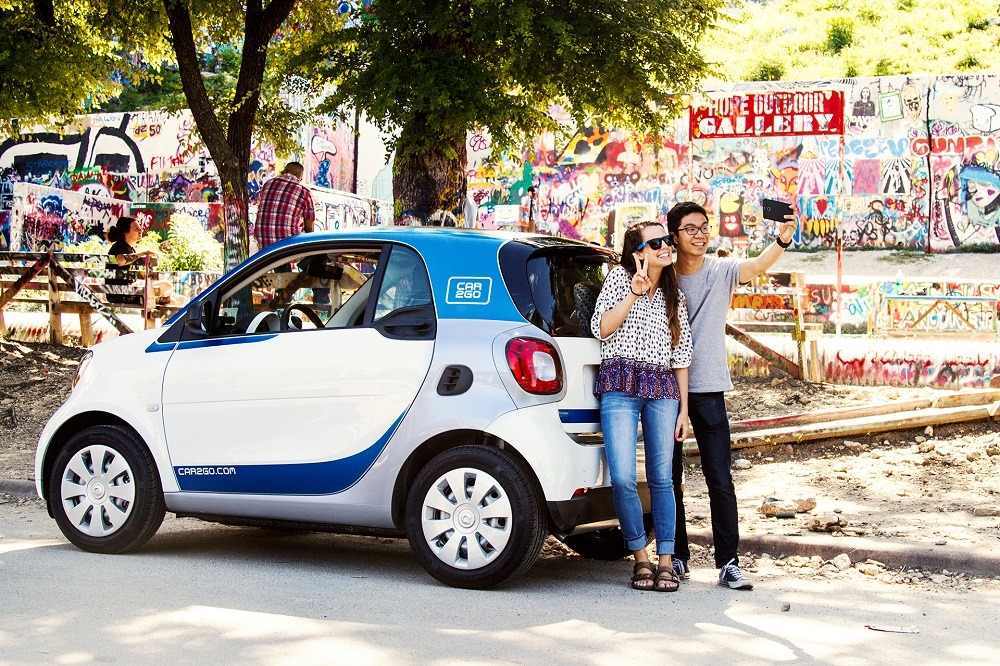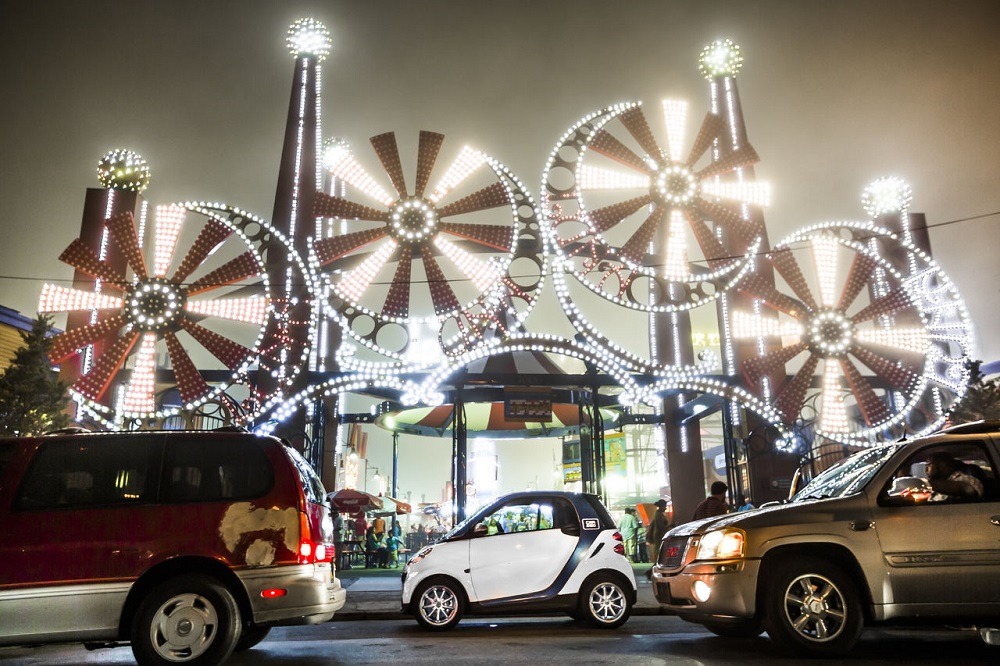Olivier Reppert, CEO of Share Now, believes that the free-floating car-sharing model represents the future of city travel

car2go has been investing heavily in the electric market, believing it is where the future lies (Credit: car2go)
According to World Bank Group, approximately 1.5 times more people will live in cities by 2045 – a total of six billion. For Share Now CEO Olivier Reppert, free-floating car sharing provides the answer by reducing traffic congestion, releasing valuable parking space and improving air quality. He spoke to CEO Journal about the project.
Interview with Share Now CEO Olivier Reppert

What has most surprised you since becoming CEO of Share Now?
It’s very exciting for me to deal with the complexity of our business every day. Whether it’s the development of our own hardware to make Smart and Mercedes-Benz cars highly connected car-sharing vehicles, whether it’s the intricacy of dealing with major fleets in 26 cities around the world, or whether it’s the algorithms to ensure clever prediction of future demand. Every day I’m working together with experts in their field who can handle this complexity perfectly, and that is what’s really great about my job.
How do you envision the future for car sharing?
A recent study by the Frost & Sullivan management consultancy predicts that the number of car-sharing users worldwide will increase five fold from the current 7.9 million to 36.7 million by 2025. All socio-economic trends currently justify free-floating car sharing – growing urbanisation, progressive digitalisation and the desire of the younger generation to use rather than own. As a result, the sector is booming. A Share Now vehicle is rented every 1.2 seconds on average.
Is there a place for autonomous vehicles in Share Now’s fleet?
Autonomous driving is an important topic for us and will, of course, have an impact on our industry. It will make the car sharing business easier. Our members are only willing to walk a certain distance to our Share Now vehicles. If semi-autonomous driving happens, the car is able to drive to our member, who can easily get in and drive off.

Today, the availability depends on the walking distance to the car. Additionally, we are able to predict demand. In combination with semi-autonomous driving, this will be the foundation for the successful management of autonomous fleets in the future.
The connected car, car-to-car (c2c) and car-to-infrastructure (c2x) communication are already a reality in free-floating car sharing. Share Now vehicles are connected and shown in real time via an app on the customers’ smartphones. The technology can, therefore, be the basis for many other connections and related services. A recent example is ‘smart ready to drop’, which makes the car a delivery address and the trunk a post box for packages.
Can you tell us more about the challenges involved in bringing car sharing to big cities?
Before the launch of a new Share Now location, the first challenge is always coming to an agreement with local authorities regarding a comprehensive business area, parking permits or the infrastructure. For us, it’s important that cities consider free-floating car sharing as a sustainable tool and as part of the mobility mix. To support it, one possibility for cities is to create car sharing parking spaces. Also, parking costs for companies like ours, that reduce the traffic in the city, should be lower.
Regarding electric mobility, the most important requirement is a fast charging infrastructure to be able to offer a high availability of our vehicles. In addition, car sharing lanes would make sustainable mobility more attractive. Other measures to support electric vehicles (EVs) could be free access to restricted traffic zones, free parking and charging, as well as funding for EV vehicles. We have also experienced that a common approach for communication and education regarding EV car sharing is beneficial.
How does car sharing free up space in cities?
Recent surveys show that free-floating car sharing vehicles like the ones from Share Now replace between six to eight automobiles in a city. Additionally, private cars are being used only for an hour a day, whereas car sharing vehicles are on the move more often. As a result, there is more space in the cities for public green areas or public use in general.
What do you think about the Netherlands’ plan to ban the sale of petrol vehicles by 2025, and will you be putting more electric vehicles on the road?
We’ve already supported this ambitious goal since our launch in 2011. Amsterdam is one of our three locations with a totally electric fleet. We are collecting experience and knowledge there to be able to promote electric mobility, because we are convinced that the future of car sharing is electric.

In general, Share Now offers 1,400 electric vehicles in Stuttgart, Amsterdam and Madrid, and thus has the largest electrical free-floating car sharing fleet in the world. More than 320,000 members have driven 60.1 million electric kilometers so far. Every tenth ride with a Share Now vehicle is electric.
Regarding our future plans, we are working closely with the city of Hamburg to make it greener and urban mobility more sustainable. Therefore, we made the concession to change half of our fleet in Hamburg to smart electric drive by mid-2019. In addition to that, Hamburg contributed to developing the electric infrastructure within the city.
What role can car sharing play in combatting climate change and pollution?
If car sharing fleets are electrically operated, the positive effect on the air quality in city centres increases. An important precondition for the operation of electric fleets is a well-developed charging infrastructure in cities. We work together with various cities to promote the use of electric mobility through car sharing.
With, Share Now millions of city residents have the first contact with electric cars. People who would otherwise never have the opportunity to drive an electric car are able to gain an insight into this environmentally friendly method of transport. We are convinced that the future of car sharing lies in the electric sector, which is why we’ve been investing in electric mobility for more than six years, and collecting experience and knowledge to be able to promote it.
What plans do you have for expansion?
We are keeping an eye on cities in existing markets in Europe, North America and Asia. Now, Share Now has more than 2.7 million members worldwide. In just one year, from December 2016, Share Now’s members increased by more than 40%.
This clearly shows the fast development of the car sharing market. Share Now has doubled the use of cars in the existing cities and will continue to follow this growth within existing locations in the following two years. Of course, we are also working on bringing our car sharing service to other cities. We’ll talk about that when we’re ready.
Do you think there is a place for the Snare Now scheme within individual businesses to replace company car use?
Of course, and we already offer a service specially developed for company fleets, called Share Now for business. Based on our free-floating car sharing service, the employees of our business partners have the possibility to use our service any time, and in the most flexible and independent way possible – from the airport or train station to the business meeting in the city, or back to the office.
For the companies, it means a massive reduction of fix costs concerning their company fleet and a way to offer a sustainable and future-oriented mobility solution for their employees.
What’s your vision for the future?
At Share Now, we are striving to improve quality of life in cities by innovating independent mobility. That is the pioneer spirit from the beginning, when we invented the concept of free-floating car sharing, and you can feel that this is part of our DNA. Operating a free-floating car sharing service for millions means managing heavy assets driven by technology.
We have 14,000 cars that we manage, we provide a truly digital product that we develop and we own the intelligence to enhance our business model based on data science and machine learning. These components allow us to be a crucial player for the future of on-demand mobility.
With the ‘connected, autonomous, shared, electric’ (CASE) project, Daimler is firmly positioned towards the future. We are proud to be an essential part of it at Share Now. Daimler is the inventor of the automobile, and Share Now is the inventor of free-floating car sharing. We will see great new mobility solutions from Daimler in the near future, and I’m looking forward to helping shape that future.
This article originally appeared in the 2018 edition of CEO Journal. The full issue can be viewed here. car2go was merged with DriveNow to form ShareNow following publication.


